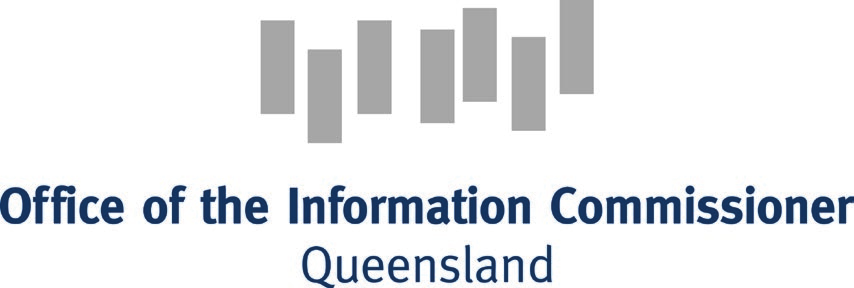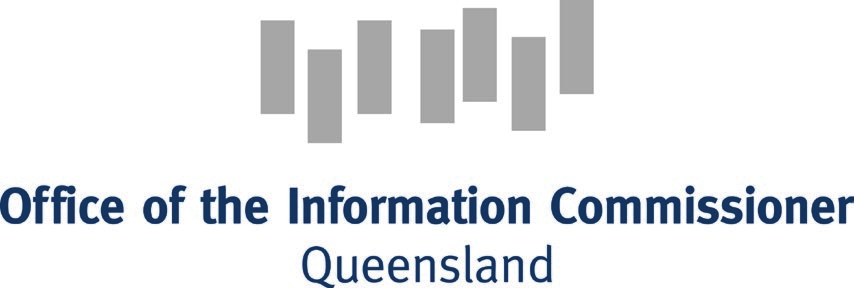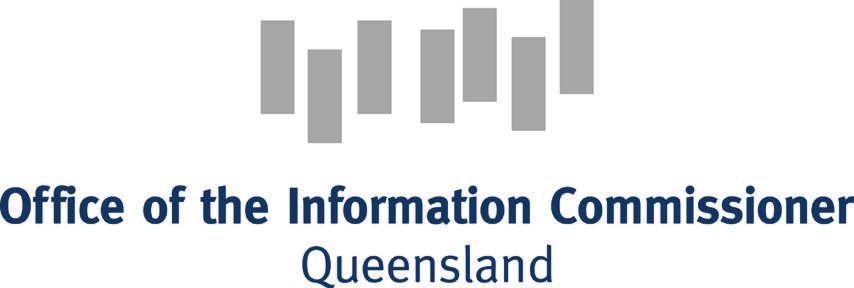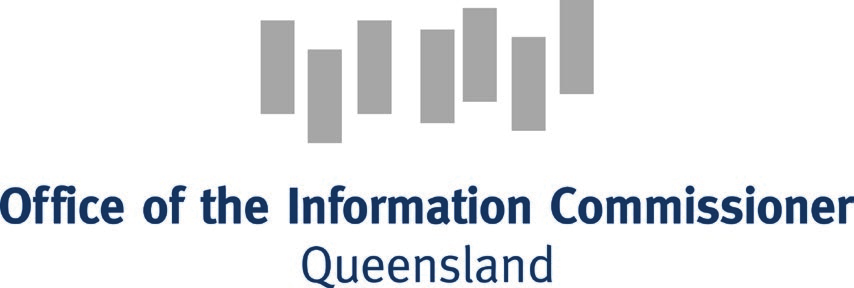link to page 1 link to page 1 link to page 1
 Information Sheet
Information Sheet
Right to Information Act 2009 and Information Privacy Act 2009
How do I apply for government documents?
The
Right to Information Act 2009 (Qld)
(
RTI Act)
and the
Information Privacy Act
2009 (Qld)
(
IP Act)
give you the right to apply for access to documents from
Queensland government departments, Ministers, local councils, public hospitals,
public universities and statutory bodies. These are called "the agency" in this
Information Sheet.
This Information Sheet wil help you make an application to an agency under the
RTI Act or IP Act.
1 If you want documents from more than one agency, you wil
need to make a separate application to each agency.
Wil I get the information I want?
It depends on what you are applying for. You wil usually get access to your own
information, but in most cases you wil not be given access to someone else’s
personal information, the name of someone who made a complaint about you, or
information about an active investigation. This is because it is contrary to the
public interest to release that information.
These information sheets explain mor
e: What is Exempt Information and What is
the public interest - a guide for applicants.
The application form
You need to fil out the application form to make an application under the RTI Act
or IP Act. The same application form is used for both RTI Act and IP Act
applications. You can download it from
www.rti.qld.gov.au. The link to the form
can be found on the right hand side, towards the bottom of the page.
Alternatively, you can contact the agency or the Office of the Information
Commissioner (
OIC)
2 to ask for an application form to be posted or emailed to
you.
Applying to a department
If you are applying to a Queensland government department, you can use the
online form
3. It can
only be used for applications to departments. For all other
agencies, you must use the PDF version of the form.
1 This Information Sheet wil primarily assist people who are completing the paper form. If you need help with
the online application form you can contact the OIC Enquiries Service for general assistance.
2 The OIC Enquiries Service can be contacted on 07 3234 7373 or by emaili
ng xxxxxxxxx@xxx.xxx.xxx.xx
3
https://www.smartservice.qld.gov.au/services/information-requests/apply.action
Right to Information and Privacy Guidelines
1

 How to complete the application form
How to complete the application form
The black triangles on the form indicate which sections must be completed.
Contact details
This section is where you enter your personal details such as name, email, postal
address and preferred method of contact. If someone is acting on your behalf
(they are called your agent) then the agent’s details should be entered here.
Question 1: Application type?
In this section you need to tick whichever box most closely describes the type of
documents you are seeking.
If you are
only applying for documents which contain your personal information
(or information of the person on whose behalf the application is being made; see
How to help someone make an access application for more information) then
select
“a” under Question 1 on the application form.
If you are applying for
some documents which do not contain your personal
information (even if some other documents wil ) then the application must be dealt
with under the RTI Act. Select
“b” under Question 1
on the application form.
If
none of the documents you are applying for contain your personal information
then the application must be dealt with under the RTI Act. Select “
c”
under
Question 1
on the application form.
For more guidance see the Information Sheet:
What is personal information?.
Application fee and processing charges
There is no application fee or processing charges for applications made under the
IP Act.
If you want to access any documents which do not contain your personal
information, your application must be made under the RTI Act (see above). From
1 July 2023, there is an RTI application fee of $55.75 and possible processing
charges of $8.65 per fifteen minutes spent working on the application. The
application fee cannot be waived. There may also be access charges of $0.25
per A4 page for paper copies, but these wil not apply for electronic copies.
Right to Information and Privacy Guidelines
2
link to page 3

If you have questions about how to pay the application fee, please contact the
agency you are applying to. You can find a lis
t of RTI and IP agency contacts for
departments on the RTI website.
4 If the agency is not a department then refer to
their website to locate contact details for the RTI Unit. If you cannot find the
agency’s contact details, the OIC Enquiries Service may be able to assist you.
See the Information Sheets:
Fees and Charges and
Applying for financial
hardship as an individual for more information about fees and charges in relation
to your application.
Question 2: On behalf of the applicant?
If you are making the application for yourself, select “no”.
If someone is acting as your agent, they should select “yes” and enter your name
at Question 2.
Note
If the documents wil contain your personal information there are additional
evidence of identity and evidence of authority requirements for the agent.
These are explained below.
For more guidance s
ee How to help someone make an access application.
Question 3-4: Benefit of another person?
If you are applying under the IP Act you can ignore these questions.
If you are applying under the RTI Act you must answer them. If you are seeking
access for the use or benefit of another person, company, or body then you must
specify this at questions 3-4. For example, a parent applying for information about
a school which they intend to provide to the Parents & Citizens Association would
tick yes at question 3 and write the name of the P&C at question 4.
Question 5: Agency?
Write the name of the Queensland government agency or Minister you are
applying to in this section (for example, Queensland Police Service, your local
council, Metro North Hospital and Health Service).
If you want to apply to more than one agency you must fil out a separate
application form for each agency.
Question 6: Which documents?
This section is where you write down what documents you are applying for. The
decision maker who wil process your application is unlikely to have any
knowledge of your interactions with the agency, so you must give them the
information they need to conduct searches for the documents you seek. Be as
4
http://www.rti.qld.gov.au/rti-ip-agency-contacts
Right to Information and Privacy Guidelines
3
link to page 4

specific as possible, because it will help the decision maker find all of the
documents.
It is important to remember you can only apply for documents that already exist.
You can’t ask questions or ask for documents to be created for you.
If your application is too big, there is a chance the agency wil not be able to
process it. They wil discuss this with you if this occurs.
The questions at 6(b)-6(f) may not be relevant to your application, but if they are,
answering them wil help the agency find the documents. If you do not have this
information, or if they are not relevant, you can leave them blank.
Evidence of identity
If you are applying for any documents which contain your personal information
(for example, your name) then you must provide evidence of your identity with the
application form.
5 Examples of evidence of identity include:
• a passport
• a copy of a birth certificate or extract
• a driver licence
• a statutory declaration from an individual who has known the person for at
least one year
This ID must not be expired. If you are providing a photocopy of your ID, it must
be certified as a correct copy of the original by a Justice of the Peace (JP),
Commissioner for Declarations, lawyer or Notary Public.
You cannot black out or remove any information from your ID before you give it
to the agency. If you do, your ID wil not be valid for the RTI or IP Act and the
agency wil ask you to send them a new copy of your ID showing all the
information. They wil not be able to process your application until they have this.
Applicants who are incarcerated have different ID requirements. These are
outlined i
n Applying while incarcerated in Queensland.
If an agent is acting for you and any of the documents being applied for wil contain
your personal information, then the agent must also provide:
• evidence of their own identity (the same requirements as the
applicant’s evidence of identity); and
• proof of authority to act as your agent.
If someone is applying for you or helping you apply, they can refer
to How to help
someone make an access application.
5 Or within 10 business days of making the application.
Right to Information and Privacy Guidelines
4
 Contact from the agency
Contact from the agency
Some agencies wil send you an acknowledgement letter when your application
is received, however this is not a requirement and you may not receive one.
If you do not hear from the agency and would like to confirm your application was
received, or you have any questions about your application, you can contact the
RTI Unit at the agency directly.
For additional information and assistance please refer to the OIC’s guidelines, or
contact the Enquiries Service on 07 3234 7373 or email
xxxxxxxxx@xxx.xxx.xxx.xx.
This information sheet is introductory only, and deals with issues in a
general way. It is not legal advice. Additional factors may be relevant
in specific circumstances. For detailed guidance, legal advice should
be sought.
If you have any comments or suggestions on the content of this
document, please submit them
to xxxxxxxx@xxx.xxx.xxx.xx.
Published 13 April 2017 and Last Updated 13 March 2024
Changes to legislation after the updated date are not included in this document
Right to Information and Privacy Guidelines
5






